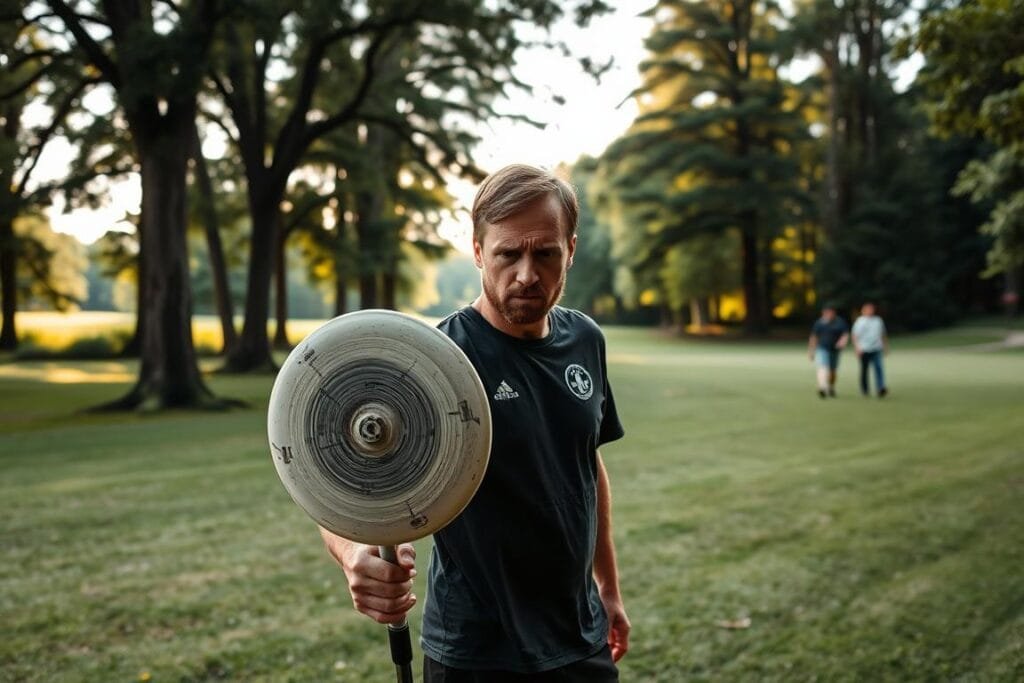As a niche sport, disc golf relies on its community to maintain a positive reputation. When out on the course, players are representatives of the game, and their behavior can significantly impact the experience of others.
The relative lack of formal structure in recreational disc golf is one of its appealing aspects. However, this freedom brings a responsibility to adhere to unwritten rules that promote safety, respect, and enjoyment for all players.
Understanding proper behavior is crucial for new players to integrate smoothly into the community and avoid common mistakes that can frustrate experienced players. By following tips on etiquette, players can contribute to the sport’s positive growth and continued accessibility.
Understanding Disc Golf Etiquette
Disc golf etiquette serves as the backbone of the sport, ensuring that players can enjoy the game in harmony with nature and each other. Most disc golf courses are planned, built, and maintained by volunteers who donate their time and effort without expecting payment.
Understanding the importance of etiquette in disc golf is crucial for a positive experience.
Why Etiquette Matters in Disc Golf
Etiquette in disc golf matters because it creates a positive atmosphere for players of all skill levels. Good disc golf etiquette ensures that the game is enjoyable for everyone involved.
| Benefits of Etiquette | Description |
|---|---|
| Positive Atmosphere | Creates an environment where players can enjoy the sport without conflict. |
| Efficient Play | Reduces wait times, allowing more people to enjoy the course. |
| Environmental Respect | Helps maintain the natural beauty of the course. |
How Good Etiquette Benefits Everyone
When players follow proper etiquette, it benefits everyone involved. It demonstrates respect for the course, the volunteers who maintain it, and other players.
By following etiquette guidelines, players show appreciation for the effort that goes into creating and maintaining disc golf courses, encouraging continued investment in the sport.
Safety First: Preventing Accidents and Injuries
The safety of players is the most important aspect of disc golf etiquette. Ensuring that the course is navigated safely is crucial for preventing accidents and injuries.
When playing disc golf, it’s essential to be mindful of your surroundings and the other players on the course. One of the primary concerns is ensuring that the hole is clear before throwing a disc. This may involve walking ahead to check around corners or over hills.
Never Throw When Others Are in Range
Always check that the area is clear before throwing. This includes checking for other players in the direct line of your shot or in the surrounding area. Throwing when others are in range can lead to serious injuries.
Precautions for Safe Play
- Be aware of your surroundings and other players.
- Check the hole and surrounding area before throwing.
- Use spotters for blind shots.
Proper Use of “Fore!” and Other Warnings
Using warnings like “Fore!” is crucial when a disc is heading towards other players or people in the surrounding area. This alert system helps prevent accidents by warning others of an incoming disc.
| Safety Measure | Description | Benefit |
|---|---|---|
| Checking the hole | Ensuring the area is clear before throwing | Prevents hitting other players with a disc |
| Using “Fore!” | Warning others of an incoming disc | Alerts others to potential danger |
| Spotters for blind shots | Verifying the area is clear before throwing | Enhances safety on the course |
Handling Blind Shots Safely
Blind shots present unique safety challenges. To handle them safely, players should send a spotter ahead to verify that the area is clear. Some courses also use bells or mirrors to help manage blind shots.
By following these safety guidelines, disc golfers can significantly reduce the risk of accidents and injuries on the course.
Respecting the Course Environment
As disc golfers, we have a responsibility to respect the course environment. This not only ensures the longevity of the course but also enhances the overall experience for all players.
Leave No Trace: Proper Trash Disposal
One of the simplest ways to show respect for the course is by properly disposing of trash. This includes picking up after yourself and others if necessary. Always carry a small bag to collect your trash and dispose of it in the designated bins.
- Pack out what you pack in, including food wrappers and water bottles.
- Participate in course clean-up events if available.
- Encourage fellow players to do the same.
Preserving Trees and Natural Features
The natural beauty of a disc golf course is part of its appeal. To preserve this, be mindful of your surroundings and avoid damaging trees and other natural features. Refrain from throwing from or standing in sensitive areas to minimize your impact.
Following Park Rules and Regulations
Many disc golf courses are located within larger parks or recreational areas that have their own rules and regulations. Before playing a new course, take time to read posted signs about hours of operation, restricted areas, and specific course guidelines. Understanding and following these rules helps maintain good relations with park management and ensures the continued availability of the course for disc golf.
- Familiarize yourself with local ordinances and park/course rules.
- Obey posted signs and course rules, such as those related to golf cart usage.
- Be aware of specific etiquette requirements when sharing the space with traditional golf.
Essential Disc Golf Etiquette for Group Play
In disc golf, group etiquette is key to maintaining a positive and respectful atmosphere on the course. When playing with others, being mindful of your actions and their impact on fellow players is crucial.
Proper Throwing Order and “Honors” System
The “honors” system is a traditional way of determining the throwing order in disc golf. Typically, the player with the best score on the previous hole goes first. This system promotes a smooth and respectful pace of play.
Being Quiet and Still During Others’ Throws
When a player is about to throw, it’s essential to be quiet and still. Avoid making sudden movements or loud noises that could distract the player and affect their shot.
Helping Find Lost Discs
Losing a disc can be frustrating, but having your group members help search for it can make a big difference. It’s a courtesy that shows respect for the player’s time and property.
Clearing the Basket After Completion
Removing your disc from the basket as soon as it’s securely in is a common courtesy. This act, known as “clearing the basket,” prevents interference with other players’ putts. The benefits of clearing the basket are numerous:
| Benefit | Description |
|---|---|
| Prevents Interference | Discs left in the basket can block or deflect incoming putts. |
| Sets a Good Example | The player who finishes first should clear their disc immediately. |
| Courtesy in Tournament Play | Leaving discs in the basket could be considered a courtesy violation. |
By following these guidelines, players can ensure a enjoyable and respectful game for everyone involved.
Managing Pace of Play
To ensure a pleasant experience for all, managing the pace of play is vital. A well-managed pace allows players to enjoy their round without unnecessary delays or frustrations.
Letting Faster Groups Play Through
When a faster group is behind you, it’s courteous to let them play through. This not only speeds up the game for them but also reduces pressure on your group. To do this, simply wave them ahead and wait until they are out of range before resuming play. This simple act of courtesy can significantly enhance the overall experience for both groups.
Keeping Your Own Group Moving Efficiently
Maintaining an efficient pace doesn’t mean rushing; it means being prepared and mindful of time management during your round. To achieve this, develop a consistent pre-shot routine that allows for focus without unnecessary delays. Have your disc selected before it’s your turn to throw, and position yourself strategically around the course to be ready when it’s your turn. When searching for a disc, establish a reasonable time limit before declaring it lost and moving on. This helps keep your group moving and prevents frustration for the players behind you.
- Be prepared to throw when it’s your turn.
- Limit the time spent searching for a lost disc.
- Avoid excessive practice throws or lengthy discussions.
By following these guidelines, you can help maintain a good pace for your player group and ensure a enjoyable round for everyone involved.
Handling Lost and Found Discs
Disc golf etiquette extends to handling lost and found discs, ensuring that the game remains enjoyable for everyone involved. Lost discs can be a significant inconvenience for players, but there are steps that can be taken to increase the chances of recovery.
What to Do When You Find Someone’s Disc
If you find a disc that doesn’t belong to you, the first step is to check if there’s any identification on it, such as a name, phone number, or email address. If there’s no identifying information, you can ask other groups on the course if they’ve lost a disc. It’s also helpful to leave the disc in a visible location or at the course’s lost and found if available.
Returning a lost disc can be a significant courtesy to the player who lost it. Some players even offer a small reward for the return of their disc, which can be a nice gesture of appreciation.
| Action | Description | Benefit |
|---|---|---|
| Check for ID | Look for name, phone number, or email on the disc. | Directly contact the owner. |
| Ask Other Groups | Inquire if other players have lost a disc. | Increases the chance of finding the owner. |
| Leave in a Visible Spot | Place the disc where it can be easily seen. | Helps the owner locate the disc. |
How to Mark Your Discs to Increase Return Chances
Marking your discs with contact information is a straightforward way to ensure they can be returned if lost. Using a permanent marker, write your phone number or email on the underside of your discs. Some players prefer to include only partial contact information for privacy reasons.
Additionally, consider using a unique marking system or personalizing your discs to make them instantly recognizable as yours. If your contact information changes, be sure to update the markings on your discs to keep the information current.
Proper Disc Golf Etiquette in Competitive Settings
Competitive disc golf settings require a distinct approach to etiquette that balances sportsmanship with rule enforcement. In a tournament setting, players are expected to adhere to a higher standard of conduct, one that prioritizes fair play and respect for fellow competitors.
The distinction between competitive and casual play is significant. While casual rounds are about enjoying the game, tournaments are about competition, and the atmosphere is more formal. Understanding this difference is key to exhibiting proper etiquette.
Tournament vs. Casual Play Differences
In disc golf tournaments, the stakes are higher, and the rules are enforced more strictly. Players are expected to be familiar with the rules and adhere to them closely. In contrast, casual play is more relaxed, with an emphasis on sportsmanship and enjoyment rather than strict rule adherence.
For instance, in a casual round, minor infractions like a foot fault might be overlooked, but in a tournament, such infractions could be called out. This difference in approach is essential to understand to avoid misunderstandings and ensure a smooth game.
When and How to Enforce Rules
Enforcing rules in disc golf requires a balanced approach. In tournament settings, rules should be applied consistently and impartially. When a violation occurs, it should be addressed promptly and explained clearly to the player involved.
In casual play, the focus should be on educating players about the rules rather than penalizing them for minor infractions. When calling a rule violation, it’s essential to do so respectfully and privately, avoiding confrontational language. The goal is to ensure fair play for all players involved.
Etiquette for Shared Spaces
As representatives of the disc golf community, players have a responsibility to be respectful and courteous to others on the course. This includes being mindful of non-players and other park users who may be sharing the space.
Interacting with Non-Players on the Course
When encountering non-players on the course, it’s essential to be respectful and considerate. This can include letting them play through if they’re waiting to throw, being mindful of noise levels, and avoiding littering or damaging the course environment. By being courteous, disc golfers can help create a positive experience for others and promote a good image of the sport.
Some key considerations when interacting with non-players include being aware of your surroundings, keeping noise levels down, and being patient and willing to let others play through. This helps to ensure a smooth and enjoyable experience for everyone involved.
Being a Good Ambassador for the Sport
Every disc golfer serves as an ambassador for the sport, and their behavior can significantly impact how others perceive the game. To be a good ambassador, players should demonstrate courtesy, respect, and patience with both fellow players and non-players. This includes being mindful of language and noise levels, taking opportunities to educate interested onlookers about disc golf, and supporting course maintenance efforts.
Key Ambassador Behaviors:
| Behavior | Impact |
|---|---|
| Demonstrating courtesy and respect | Builds a positive reputation for the disc golf community |
| Educating onlookers about disc golf | Promotes understanding and appreciation of the sport |
| Supporting course maintenance | Contributes to the longevity and quality of the course |
Common Courtesy Considerations

Practicing common courtesy on the disc golf course enhances the experience for everyone involved. This includes being mindful of your behavior and its impact on others, whether they are fellow players or simply enjoying the park.
Music Volume and Personal Devices
When playing disc golf, it’s considerate to keep the volume of personal music devices low enough that you can still hear your surroundings. This not only enhances your safety but also allows you to be more aware of other players and park-goers. Being aware of your environment is key to a positive experience for all.
- Keep music volume at a level where you can hear others approaching or warnings like “fore!”.
- Avoid using speakerphones or loud devices that could disturb others.
Managing Frustration and Maintaining Composure
It’s normal to feel frustrated during a round of disc golf, especially after a bad shot. However, managing your frustration is crucial for maintaining a positive atmosphere on the course. Excessive displays of anger can be distracting and give a bad impression to others.
- Take a deep breath or use humor to diffuse frustration after a bad shot.
- Avoid dwelling on mistakes, as this can lead to further errors and a negative experience.
- Consider how your reactions might be perceived by non-players who are forming impressions of disc golf.
Becoming a Respected Disc Golf Player
The true mark of a disc golf enthusiast lies not just in their throwing accuracy but in their respect for the game and its community. Becoming a respected disc golf player involves more than just mastering the technical skills; it requires consistently demonstrating good disc golf etiquette and sportsmanship.
Learning both the written rules and unwritten etiquette guidelines shows a commitment to the sport and respect for its community. Respected players lead by example, modeling proper behavior for newcomers and helping to maintain the welcoming culture of disc golf. This includes following etiquette tips such as respecting the course environment, being mindful of other players, and maintaining a positive attitude.
By embracing these principles, players can contribute to a positive experience for everyone on the course. Developing a reputation as a courteous player leads to more enjoyable rounds of golf, as others will be eager to play with someone who enhances the experience. Ultimately, the best disc golfers understand that respecting the course, following golf etiquette, and maintaining a positive attitude are just as important as technical skills.



